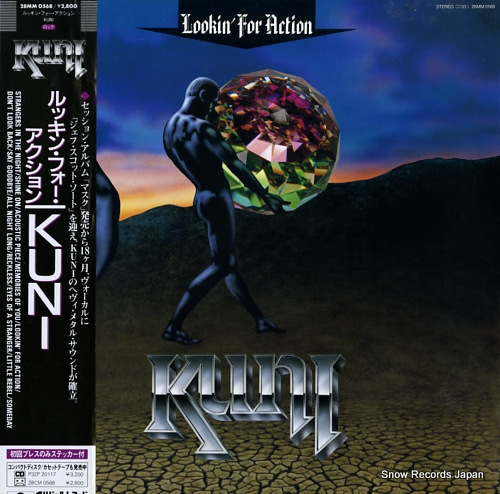KUNI lookin' for action 28MM0568
Please see Online Shop for current stock availability



Artist = KUNI
Title = lookin' for action
Label = POLYDOR
Catalog# = 28MM0568
Barcode = 4988005019585
Release = JAPAN
Year = 1988
RPM = 33rpm
Disc Size = 12"
Number of Discs = 1
Mono/Stereo = stereo
12trk, jef scott soto, mike terrana promo sample, white label
*Search KUNI on Online Shop
*Search KUNI on Blog
* Search KUNI on YouTube



















































1 commentaire
Chasing the Action: KUNI’s Sophomore Album ‘Lookin’ For Action’ (28MM0568)
Today we revisit the work of Japanese guitar virtuoso Kuni Takeuchi, known as KUNI, focusing on his second solo album, “Lookin’ For Action,” released with the catalog number 28MM0568, promo/sample white labels with obi..
Issued in 1988 on the Polydor label, this 12-inch vinyl LP followed his impressive 1986 debut, “Masque.” KUNI had already established a pattern of combining his own fiery, melodic guitar skills with contributions from high-profile international rock musicians, and “Lookin’ For Action” continued this successful formula.
The album is a quintessential example of late-80s melodic hard rock and heavy metal, built around KUNI’s impressive guitar riffs and solos. Elevating the project once again was a stellar cast of guest performers. Vocal duties were shared by Jeff Scott Soto (returning from “Masque”) and the legendary Kevin DuBrow of Quiet Riot fame. The rhythm section featured renowned players like bassist Chuck Wright (Quiet Riot, Giuffria, House of Lords) and drummer Frankie Banali (Quiet Riot – also returning), alongside powerhouse drummer Tommy Aldridge (Ozzy Osbourne, Whitesnake) and bassist John Alderete (later known for Racer X, The Mars Volta). Keyboardist John Purdell also reprised his role from the debut.
This all-star lineup ensured a powerful and polished sound, perfectly complementing KUNI’s guitar-driven compositions. “Lookin’ For Action” (28MM0568) delivered another dose of high-quality, catchy, and expertly played melodic metal, further cementing KUNI’s reputation both in Japan and among international fans of the genre. It remains a standout collaborative effort from the era.